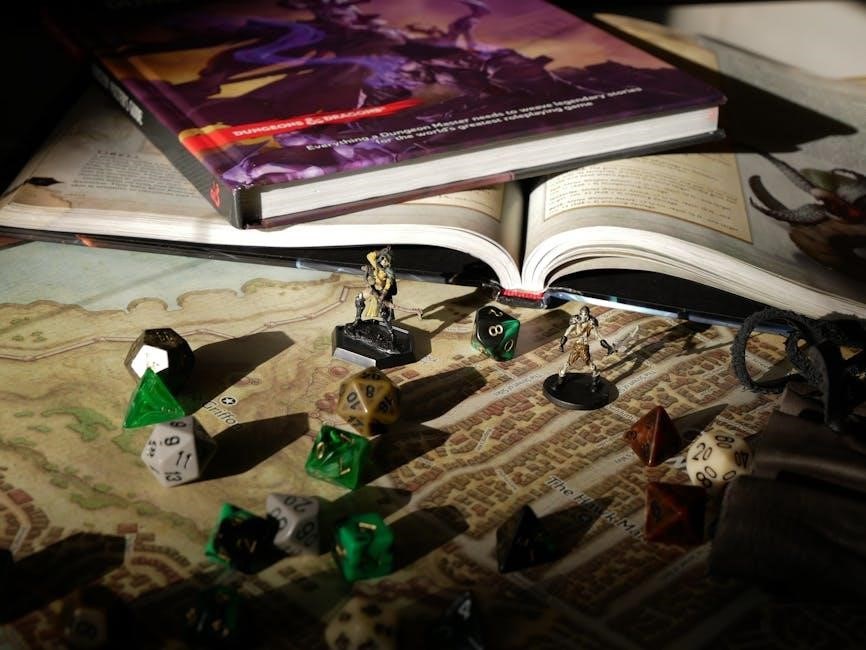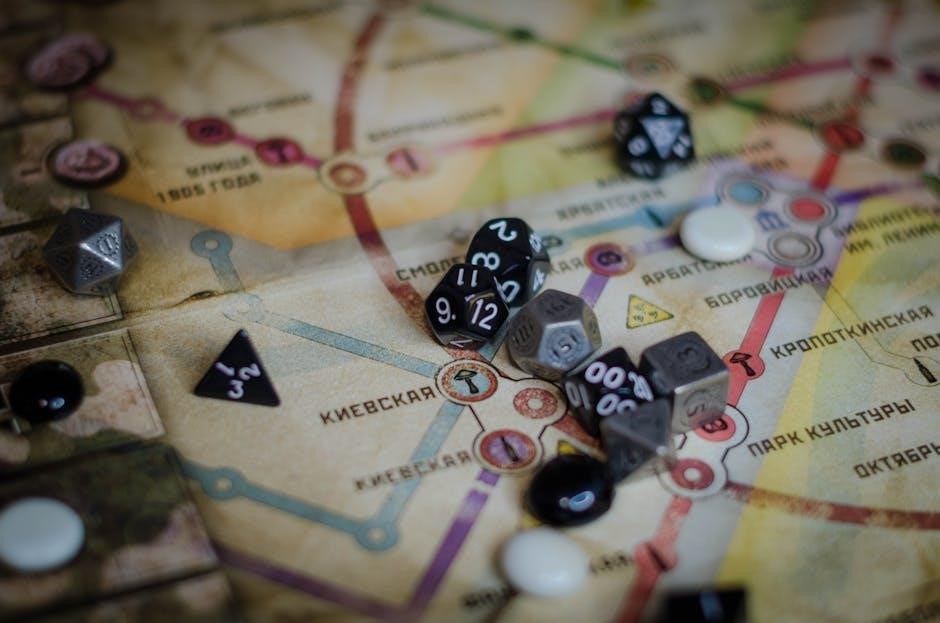
merp rpg pdf
MERP (Middle-earth Role Playing) is a tabletop RPG based on J․R․R․ Tolkien’s Lord of the Rings and The Hobbit․ Published by Iron Crown Enterprises in 1984, it allows players to explore Middle-earth, creating characters like Hobbits, Elves, and Dwarves․ Community contributions and PDF resources, including rulebooks and adventures, keep the game alive despite the end of official support in 1999․ MERP combines rich storytelling with detailed mechanics, making it a beloved classic in the RPG world․
What is MERP?
Middle-earth Role Playing (MERP) is a tabletop role-playing game set in J․R․R․ Tolkien’s Middle-earth․ Published by Iron Crown Enterprises (I․C․E․) in 1984, it allows players to create characters such as Hobbits, Elves, Dwarves, and Men, embarking on adventures in a richly detailed world․ MERP is based on Tolkien’s works, including The Lord of the Rings and The Hobbit, and is officially licensed by Tolkien Enterprises․ The game emphasizes storytelling, character development, and strategic gameplay, with a focus on Middle-earth’s lore and geography․ Players engage in quests, combat, and skill-based progression, guided by a game master who narrates the story and controls non-player characters․ MERP’s mechanics are rooted in I․C․E․’s Rolemaster system, offering a complex yet immersive experience․ Over the years, MERP has gained a dedicated fan base, with numerous PDF resources, including rulebooks, adventures, and community-created content, ensuring its legacy endures even after official support ended in 1999․
History of MERP
Middle-earth Role Playing (MERP) was first published in 1984 by Iron Crown Enterprises (I․C․E․), marking a significant milestone in tabletop RPG history․ As one of the first officially licensed Tolkien-based RPGs, MERP allowed fans to immerse themselves in J․R․R․ Tolkien’s Middle-earth, creating characters such as Hobbits, Elves, and Dwarves․ The game’s release coincided with a surge in popularity of tabletop gaming, making it a groundbreaking title․ MERP was built on I․C․E․’s Rolemaster system, known for its intricate rules and depth, appealing to both casual and experienced gamers․ Over the years, MERP expanded with supplementary materials, including adventures and rule expansions, enhancing its replayability․ Despite losing the Tolkien license in 1999, MERP’s legacy endured through community support․ Fans continued to create and share PDF resources, ensuring the game’s accessibility and popularity․ Today, MERP remains a cherished classic, with its 1st and 2nd editions, along with supplementary materials, being sought after by collectors and enthusiasts alike․
Significance of MERP in Tolkien’s Universe
Middle-earth Role Playing (MERP) holds a unique place in J․R․R․ Tolkien’s universe by offering fans an interactive way to engage with Middle-earth․ As the first officially licensed RPG based on Tolkien’s works, MERP allowed players to explore iconic locations like the Shire, Mirkwood, and Gondor, immersing themselves in the lore and cultures of Elves, Dwarves, and Men․ The game’s detailed character creation and rich storytelling mechanics align with Tolkien’s thematic depth, enabling players to craft narratives that feel authentic within his world․ MERP’s significance extends beyond gaming; it serves as a gateway for newcomers to discover Tolkien’s literature while offering veterans a new lens to view beloved stories․ Community-created PDFs and expansions further enhance this connection, ensuring that MERP remains a vibrant medium for experiencing Middle-earth’s magic․ Its ability to blend creativity with fidelity to Tolkien’s vision ensures MERP’s enduring relevance as both a game and a tribute to the author’s legacy․

Core Features of MERP RPG
MERP RPG offers character-based gameplay, blending skills, magic, and detailed mechanics․ It emphasizes storytelling and immersion in Middle-earth, with rules for character advancement and combat, making it a comprehensive system for Tolkien enthusiasts․
Game Mechanics
MERP RPG features a skill-based system where characters advance through experience and skill development rather than traditional levels․ The game uses a d100 system, where players roll a percentile dice to determine success or failure in actions, with modifications based on skill levels, attributes, and equipment․ Combat mechanics are detailed, incorporating tables for weapon strikes, critical hits, and fumbles, adding depth and realism․ Magic is integrated as a powerful but balanced system, with spells divided into categories like Arcane, Divine, and Essence․ The game also includes rules for crafting, exploration, and social interactions, making it versatile for various playstyles․ Character creation is flexible, allowing players to customize races, professions, and skills, ensuring unique experiences․ MERP’s mechanics emphasize storytelling and immersion, making it a popular choice for fans of Tolkien’s Middle-earth․ The system’s complexity and depth have inspired community contributions, including custom character sheets and tools, keeping the game vibrant even after official support ended․

Character Creation and Development
Character creation in MERP is a detailed process, allowing players to craft unique characters based on J․R․R․ Tolkien’s Middle-earth․ Players choose from various races, including Hobbits, Elves, Dwarves, and Men, each with distinct racial traits and bonuses․ Professions such as Warrior, Mage, Scout, or Rogue further define a character’s role, providing starting skills and equipment․ The system emphasizes skill-based progression, where characters develop through experience and skill improvements rather than traditional leveling․ Attributes like Strength, Agility, and Intelligence influence abilities, while skills are advanced through point allocation․ The game also includes rules for character background and personality traits, adding depth to role-playing․ Community resources, such as custom character sheets and tools, aid in creating and managing characters․ This flexible system ensures that each character is unique, tailored to the player’s preferences, and deeply integrated into the rich lore of Middle-earth․ The development process is designed to be immersive, allowing players to grow their characters over time within Tolkien’s iconic world․

Role of Magic and Skills
In MERP, magic and skills are integral to character development and gameplay․ Magic is typically reserved for specific classes like Mages and is divided into realms such as Arcane, Nature, and Spirit, each with unique spells․ The system emphasizes strategic spell selection and resource management, often requiring spell points or specific dice rolls․ Skills cover a wide range of abilities, from combat skills like swordsmanship to non-combat skills like persuasion, and are developed through experience and point allocation․ Characters can specialize in skills based on their profession and race, enhancing their effectiveness in various roles․ The game’s mechanics, based on the Rolemaster system, use a percentile-based skill check system, where success is determined by rolling a d100 against the character’s skill level․ Supplementary materials and community contributions offer additional skills and magic options, expanding the game’s depth․ Overall, magic and skills in MERP reflect the rich lore of Middle-earth, providing a balanced and immersive experience for players․

Official MERP PDF Resources

Official MERP PDFs include the 1st and 2nd Edition rulebooks, providing core mechanics, character creation, and Middle-earth lore․ Supplementary materials and adventures expand gameplay, offering detailed settings and scenarios․ These resources are essential for both new and veteran players․
MERP Rulebook 1st Edition
The MERP Rulebook 1st Edition, published in 1984 by Iron Crown Enterprises, is the foundational guide for the Middle-earth Role Playing game․ This rulebook introduced players to the detailed mechanics, character creation, and skill systems that define MERP․ It includes core rules for character development, task resolution, and combat, set against the rich backdrop of J․R․R․ Tolkien’s Middle-earth․ The 1st Edition is notable for its faithful adaptation of Tolkien’s works, offering players the chance to embody iconic races like Hobbits, Elves, and Dwarves․ The rulebook also provides an extensive overview of Middle-earth’s geography, history, and cultures, making it a vital resource for both new and experienced players․ Community archives and PDF repositories continue to preserve this edition, ensuring its availability for modern enthusiasts of Tolkien and tabletop RPGs․
MERP Rulebook 2nd Edition
The MERP Rulebook 2nd Edition, released in 1993, refined the original game system, offering improved mechanics and expanded content․ It built upon the 1st Edition’s foundation, introducing streamlined rules for character creation, skill development, and task resolution․ The 2nd Edition also incorporated elements from Tolkien’s expanded legendarium, including detailed descriptions of Middle-earth’s races, cultures, and locations․ This edition is particularly noted for its enhanced magic system and expanded skill lists, providing players with greater customization options․ The rulebook’s PDF is widely available through community archives and fan sites, as official support ended in 1999․ A Collector’s Edition of the 2nd Edition was later released, combining core rules with supplementary materials․ This edition remains popular among enthusiasts, offering a balanced blend of complexity and accessibility․ Its detailed framework ensures immersive storytelling, making it a cornerstone of MERP’s legacy in tabletop RPGs․
Supplementary Materials and Adventures
Supplementary materials and adventures for MERP expand the game’s depth and richness, offering players and GMs a wealth of options to enhance their Middle-earth campaigns․ These resources include detailed modules, character sheets, and optional rules that flesh out specific regions, races, and professions; Adventures like The Northern Waste and Lords of Middle-earth provide pre-designed storylines, NPCs, and challenges, allowing players to immerse themselves in iconic locations like Gondor, Mirkwood, and the Misty Mountains․ Many of these materials are available as free PDFs from community archives, preserving the game’s legacy despite the end of official support․ Tools like character generators and spell modification guides further customize gameplay, catering to both new and experienced players․ These supplementary resources ensure that MERP remains vibrant, offering endless opportunities for exploration and storytelling in Tolkien’s beloved world;

Community Contributions and Downloads
The community has created extensive resources for MERP, including free PDFs of rulebooks, adventures, and character sheets․ Archives like the Internet Archive and fan sites host these materials, ensuring accessibility and preserving the game’s legacy for new players and veterans alike․
Free PDFs from Community Archives
Community archives offer a wealth of free PDF resources for MERP, preserving the game’s legacy and ensuring accessibility․ These include the 1st and 2nd Edition rulebooks, supplementary materials, and adventures․ Fans have meticulously scanned and uploaded original books, such as the MERP 8000 Rulebook 1st Edition and MERP 2000 Rulebook 2nd Edition, making them available for download․ Additionally, community-driven platforms host character sheets, tools, and custom content, providing players with everything needed to create and develop characters․ Many of these PDFs were originally released by Decipher before they discontinued support, and they remain essential for both new and experienced players․ The archives also feature modules like The Northern Waste and Lords of Middle-earth, expanding the game’s possibilities․ These resources, often shared through forums and dedicated websites, highlight the dedication of the MERP community in keeping the game alive and vibrant, even after official support ceased․
Character Sheets and Tools
Community archives provide a variety of free PDFs for MERP character creation and management, enhancing gameplay and organization․ These resources include detailed character sheets, PC Generator spreadsheets, and tools for skill and spell management․ The PC Generator, MERP Edition (versions 1․1 to 1․4) allows players to create and develop characters systematically, covering races, professions, and attribute allocations․ Additional tools, such as Spell Casting Modifications․pdf, offer custom rules for magic users, expanding the game’s depth․ Character sheets are available in both digital and printable formats, catering to different playstyles․ These tools simplify the often complex MERP ruleset, making it accessible to new players while retaining depth for veterans․ Community contributions also include pre-made templates for adventurers, ensuring quick setup for those eager to start their Middle-earth journeys․ These resources, shared through forums and dedicated archives, demonstrate the community’s dedication to preserving and enhancing the MERP experience, even after official support ended․

Adventures and Modules

MERP offers a wide range of adventures and modules set in J․R․R․ Tolkien’s Middle-earth, providing players with immersive storytelling and diverse challenges․ Official resources like Rangers of the North․pdf and The Loons of the Long Fell․pdf feature detailed scenarios, NPCs, and locations, while community-contributed modules expand the game’s scope․ These adventures are designed to be adaptable, fitting seamlessly into larger campaigns or standing alone for quick play․ They cater to various playstyles, from combat-heavy quests to intricate political intrigue, ensuring a rich experience for all players․ The modules often include maps, encounter tables, and unique mechanics, enhancing the game’s depth․ While some adventures are tailored for specific editions of MERP, many are compatible with earlier or later versions, making them versatile for both new and veteran players․ This abundance of adventures and modules keeps the game vibrant, offering endless opportunities to explore Middle-earth’s lore and create unique stories․

MERP and Its Legacy
MERP, as the first licensed Tolkien RPG, left a lasting impact on tabletop gaming․ Its detailed mechanics and Middle-earth setting influenced later RPG systems․ Though discontinued in 1999, its legacy endures through community-shared PDFs and custom content, cherished by fans and collectors alike․
Impact on Role-Playing Games
MERP, as the first licensed Tolkien RPG, significantly influenced the tabletop role-playing genre․ It introduced players to Middle-earth’s rich lore, inspiring a wave of literature-to-game adaptations․ Its detailed character creation and skill systems set a benchmark for fantasy RPGs, while its modular design encouraged community contributions․ MERP’s success paved the way for other licensed RPGs, blending intellectual properties with interactive storytelling․ Its influence can be seen in later systems that adopted similar mechanics and settings․ Despite its discontinuation, MERP’s legacy endures through fan-created PDFs and custom content, ensuring its impact remains felt in modern tabletop gaming․
Compatibility with Other Systems
MERP’s mechanics, particularly its use of the Rolemaster system, allow for seamless integration with other RPG frameworks․ Players can adapt MERP characters and adventures to systems like Rolemaster or Fantasy Hero, enhancing gameplay diversity․ Its modular design enables GMs to incorporate custom content without disrupting core rules․ The availability of PDF resources further facilitates compatibility, as fans can modify and blend elements from various editions․ This adaptability has made MERP a versatile tool for tabletop enthusiasts, ensuring its relevance across different gaming platforms and communities․ Its compatibility with other systems underscores MERP’s enduring appeal and flexibility in modern role-playing scenarios․
Modern Relevance and Usage
MERP remains relevant today, with a dedicated fan base and extensive community contributions․ Its adaptability and rich connection to Tolkien’s lore attract both nostalgic players and newcomers․ PDF resources, including rulebooks, character sheets, and adventures, are widely available, ensuring accessibility․ The game’s compatibility with systems like Rolemaster adds to its versatility, allowing players to integrate MERP elements into diverse campaigns․ Despite the end of official support in 1999, enthusiasts continue to create and share content, keeping the game vibrant․ The availability of digital materials has introduced MERP to younger audiences, while collectors appreciate special editions․ This enduring popularity highlights MERP’s timeless appeal and the active community’s efforts to preserve and evolve the game for modern players․
Leave a Reply
You must be logged in to post a comment.